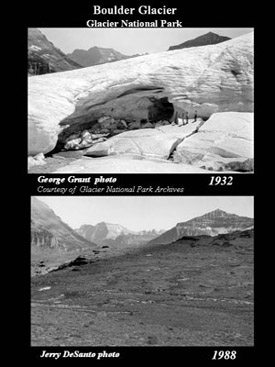Sobering news on climate change arrived today from France, where the Intergovernmental Panel on Climate Change issued a sweeping report blaming humans for global warming that is melting glaciers, spawning killer hurricanes, and initiating droughts.
 And the scientists who worked on the study say global warming will continue for hundreds of years, no matter how much we cut back on greenhouse gases.
And the scientists who worked on the study say global warming will continue for hundreds of years, no matter how much we cut back on greenhouse gases.
What does that mean for the national parks?
In the short term, glaciers will continue to retreat at places such as Glacier, Glacier Bay, Mount Rainier, and North Cascades, just to name four parks. As sea levels rise, parks such as Everglades, Biscayne and Dry Tortugas, as well as Cape Cod, Cape Hatteras, and Gulf Islands national seashores, among others, face the grim prospect of being inundated.
Elsewhere throughout the park system we're likely to see more wild fires, more vigorous infestations of exotic vegetation, perhaps a change in the native fauna as species that can't tolerate warming weather move north. That seems to be the case in Minnesota, where a landscape once rich with moose is seeing fewer and fewer of them.
Park staff across the system have been monitoring climate change for some time. In places such as northern Montana more than a decade of work has been done to study the effects of global warming on glaciers Glacier National Park.
"Glacier's ecosystem has already changed in response to a warming climate," the scientists note. "One of the most visually dramatic changes is the shrinkage of glaciers, which, in turn, affect other parts of the ecosystem. Less than one-third of the glaciers present in 1850 exist today and most remaining glaciers are mere remnants of their previous size."
Monitoring of glaciers also has been done in North Cascades, and more is needed.
"Since the end of the Little Ice Age in the late 1800's, glaciers have
retreated throughout North Cascades and we estimate that approximately 40 percent of the
park’s ice cover was lost in the past 150 years," say the researchers. "In the
Thunder Creek watershed this has resulted in a 30 percent reduction in summer
streamflow. To understand climate change, the glacier resource, and the
effect of glaciers on other resources at NOCA, long-term monitoring of
glaciers is needed.
Actually, a good bit of thought has gone into how global warming is, and will, impact the national parks. Last fall the agency published People and Parks Respond to Climate Change, a 16-page booklet that touched on not just some of the concerns but also some of the responses being mustered across the park system. Hybrid vehicles are powering shuttle fleets in the parks, biodiesel is being used at places such as Apostle Islands National Lakeshore to fuel the lakeshore's boats, and in Yellowstone to help power the park's fleet.
At Whitman Mission National Historic Site in Washington state, solar power generates an increasing amount of the site's electricity.
But conservation practices alone can't save the parks. In southern Florida, researchers say the sea level has risen 9
inches in the past 100 years, a rate six times faster than at any other
100-year window during the past 2,400 years.
"A sea level rise of 5 feet in parts of the Everglades is expected to accelerate as temperatures increase this century, causing greater storm surges and flooding," the NPS notes in its climate change booklet. "The effects could devastate the area, which is no higher than 8 feet at any location."
Back up at Glacier Park, a range of research points to "the expansion of valley cedar-hemlock forests and a rise in tree-elevation. ... Large, stand-replacing forest fires could also occur."
It's not a very encouraging picture, one that we probably can't change but perhaps one that can be slowed if we as a society can muster the will.



Comments